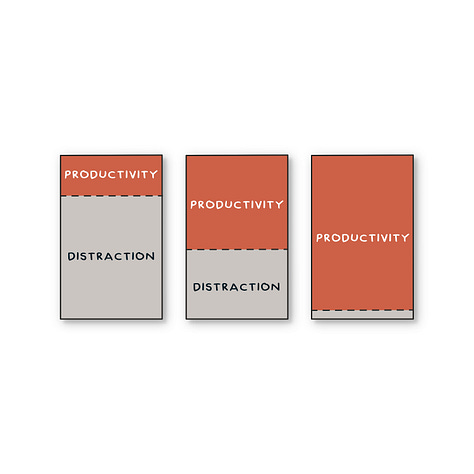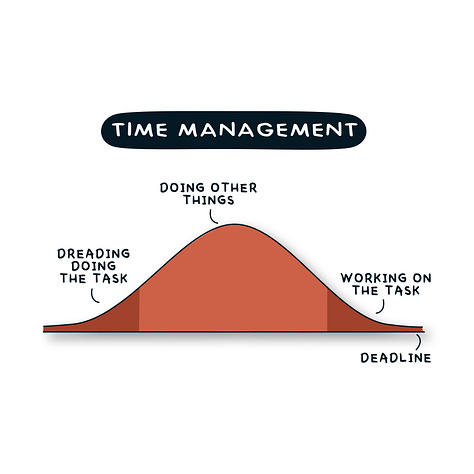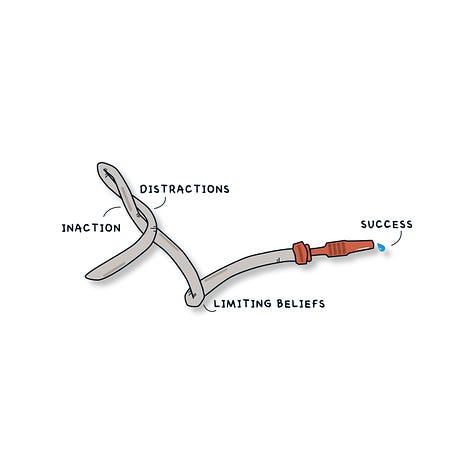The Coulds: 'Limitless' productivity, Four Thousand Weeks & some visuals
This is your weekly round-up of inspiration, links and resources around a single theme.

In the film Limitless, the main character Eddie Morra, played by Bradley Cooper, takes a magic pill which makes him hyper-productive. He learns Mandarin & Italian, masters martial arts, makes millions through trading and, mic drop, deep-cleans his whole apartment from top to bottom. This is the Great Productivity Fantasy. The logical extreme of what could happen if we actually took heed of the ‘Get Sh*t done’ mantra inscribed on that chipped office mug. If only we could override our pesky monkey brains and focus.
Except Limitless is a science-fiction movie, and a dark one at that. Slight spoiler alert here (but come on, it’s been out since 2011) a pill that offers boundless productivity turns out to be something of a poisoned chalice.
For most of us, the Great Productivity Fantasy is unattainable. As Oliver Burkeman writes in the beautifully-titled Four Thousand Weeks: Time Management for Mere Mortals, ‘Productivity is a trap… Let’s start by admitting defeat.’
‘The problem with trying to make time for everything that feels important—or just for enough of what feels important—is that you definitely never will.’
- Four Thousand Weeks
For Oliver, it’s acknowledging our limits (the title itself refers to the average human life span) that there’s liberation. We can only do so much, and so… we have to make choices. Maybe you’ll never learn Mandarin! Maybe you’ll never reach Inbox Zero! But this acceptance can help us identify and make time for the things that matter – rather than perpetually feeling that you ‘should’ or ‘should have’ done these things.
That’s only half the battle, though. Because even say, hypothetically, you drawn up a clear Productivity Matrix (I found the below here on a Tumblr from 2012), accounting for the next relevant chunk of your four thousand weeks. Say you’ve identified what’s important to you, factoring in everything you value, rating everything from ‘Tai chi practice’ to ‘hen party planning’ on a scale from 1 to 5…

…You’re still left with the emotional experience of getting through those tasks. Which, as we established in this Wednesday’s discussion thread, is as much a subjective feeling as a reality (e.g. time spent brainstorming a personal project will typically feel less productive than time spent completing a professional task, even if you’ve identified the former as a priority).
There are already enough internet resources dedicated to ‘boosting/hacking/optimising your productivity’. What I’ve focussed on in this week’s resources list is something different: a smörgåsbord of jumping-off points to reflect on productivity, and the ‘Shoulds’ that surround it. What do we really mean when we say we ‘should’ be more productive? What does ‘productive’ mean at all? How do we separate the things we feel we ‘should’ be more productive at from the things we deeply want to be more productive at? And finally, what productivity content is worth paying attention to (according to me because, well, it’s my newsletter)?
I offer you the following…
The Coulds
Books 📚
Indistractable: How to Control Your Attention and Choose Your Life by Nir Eyal: ‘Time management is pain management’, writes Nir, who takes a compassionate look on procrastination as something we do to protect us from the ‘pain’ of having to confront certain tasks (e.g. the inevitable self-doubt that comes with creative work, for instance).
Atomic Habits by James Clear: It’s a one million copy bestseller because it deserves to be. James offers simple, actionable advice around how productive habits can compound over time, based on proving yourself to yourself: ‘Every action you take is a vote for the type of person you wish to become.’
I Didn't Do The Thing Today: On letting go of productivity guilt by Madeleine Dore: On the other hand, this is a soothing ‘anti-productivity manual’ for tackling unrealistic expectations and comparison traps.
Videos 📹
Real Time Study With Me *with break* 💪 2 Hours of Productivity & Motivation from UnJaded Jade: Among its myriad consequences, loneliness can affect productivity and work performance (it’s surprising how few ‘productivity’ interventions acknowledge this). Enter the ‘Real time study with me’. I’d never come across this YouTube trend before, but it’s basically what it says on the tin – studying (or working, or whatever) alongside with a YouTuber in real-time. Ali Abdaal also does several versions, including this video of a two-hour session where he writes part of his upcoming book.
Podcast episodes 🎙
Hurry Slowly with Jocelyn K. Glei | Productivity Shame: This whole series from Brooklyn-based author & course creator Jocelyn is fantastic, including interviews with experts such as artist Jenny Odell on How To Do Nothing but I particularly like this soothing solo episode she did on productivity shame e.g. what happens when we set ‘challenging goals for ourselves without any structure for emotional support’. A game-changer – enjoy.
Diary of a CEO with Steven Bartlett | E93: Productivity Expert: How To Finally Stay Productive: Ali Abdaal: My highlight was the part around 26:06 where Ali talks about certain tasks being ‘icky’ – effectively, when there’s an undefined course of action and a lot of unresolved questions surrounding that task – and how to ‘un-ickify it’ before we start.
Ctrl Alt Delete | #338 Natalie Lue: ‘How Do We Achieve ‘Deep Work’?: In conversation with Emma Gannon, The Joy of Saying No author extols the benefits of ‘deep work’ (a term popularised by Cal Newport, to describe modern bursts of distraction-free concentration) – plus, how to get to this mythical place.
Articles/links 🗞🔗
How to Spend Time on What You Value by Arthur Brooks for The Atlantic: A transcribed interview between Arthur and happiness researcher Ashley Whillans, author of Time Smart: How to Reclaim Your Time and Live a Happier Life. For anyone who struggles to channel their productivity in the right direction.
A Valediction: of Malaise Productivity fromSomething to Say with Abigail Bergstrom: The agent and author takes on the modern phenomenon of 'working while clearly in bed sick'. If you're reading this, and attempting the same thing - stop.
What Is Productivity Paranoia? by Camille Preston PhD for Psychology Today: A feature on how hybrid working has influenced employers’ (and employees’) perceptions of ‘productivity’.
Words of wisdom 💭
‘Think of many things; do one.’ - a Portuguese proverb
‘No one on his deathbed ever said, “I wish I had spent more time at the office.”’ —Harold Kushner
I couldn’t not include this viral tweet. It’s a worthy reminder to have empathy when we’re talking about ‘productivity’ – because we don’t, as an entrepreneur fatally mentioned on Steven Bartlett’s podcast, have ‘the same 24 hours in the day’, and any conversation we have (with others, or indeed with our own inner critics) needs to be sensitive to that.
Visual aids 🎨
Recently, I had a chat with illustrator Elliott Aleksander, whose work you can follow atBe Visual, who told me how his degree in Organisational Psychology is the inspiration behind his visual designs around productivity, motivation and progress.
‘At university, I was taught the normal definition of productivity, which is about the effectiveness of your inputs to get outputs out of it. My own definition of productivity is about getting those effective outputs specifically to things that matter to you.’
I’ve followed Elliott for a while, and I enjoy the simple efficacy of his designs. But I appreciated them more once I understood the context of why he was creating them – not as an instrument of ‘hustle culture’, but actually as a resource for anyone trying to complete a fulfilling side project in their spare time (a challenge which Elliott, with three children and a full-time job, knows only too well).



One last thing 👇
Also from Oliver Burkeman’s Four Thousand Weeks:
‘The world is bursting with wonder, and yet it’s the rare productivity guru who seems to have considered the possibility that the ultimate point of all our frenetic doing might be to experience more of that wonder.’






